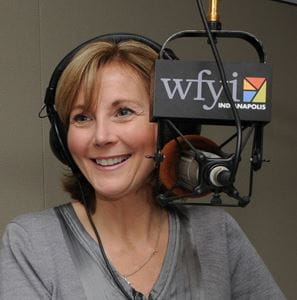“Sound Medicine,” also available via podcast and Stitcher Radio for mobile phones and iPads, covers controversial ethics topics, breakthrough research studies and the day-to-day application of recent advancements in medicine.
Are these new diet drugs worthy of FDA approval? For the first time in 13 years, the Food and Drug Administration has approved two new diet drugs, Qysymia and Belviq. Previous diet drugs have been pulled from the market after reports of heart complications stemmed from their use. Joan Temmerman, M.D., assistant professor of clinical medicine at Indiana University School of Medicine, shares the history of diet drug complications and her predictions for the level of success of Qysymia and Belviq.
What is the purpose behind plans to launch rapid HIV testing centers? The Center for Disease Control recently announced plans to offer free rapid HIV tests in several dozen communities. Beth Meyerson, M.Div., Ph.D., co-chair of the Rural Center for AIDS/STD Prevention at Indiana University, discusses how the expansion of HIV testing is critical and discusses how it will be implemented in Indiana pharmacies.
What is the impact of teens’ first sexual partners later in life? A recent study in the Journal of Women’s Health linked the age of teenage girls’ first sexual partners to the sexual risks that they will take as adults. Theresa Rohr-Kirchgraber, M.D., executive director of the IU National Center of Excellence in Women’s Health, discusses the patterns of risky behaviors and the health consequences of an adolescent girl’s first sexual experience with an older partner.
Is drug testing extensive enough at the Olympics? The International Olympic Committee predicts that more than 5,000 drug tests will be performed over the course of the 2012 Olympic trials and games. Alan Rogol, M.D., Ph.D., a pediatric endocrinologist at Riley Hospital for Children of IU Health, explains the process behind athlete drug testing and the compounds found in positive doping results.
Should high school athletes be mandated to undergo heart screenings? Sudden cardiac death among young athletes has been found to be more prevalent than previously believed, leading some experts to recommend that young athletes receive electrocardiograms. Physicals are currently the only necessary routine for high school athletes before participating in athletics. Douglas Zipes, M.D., professor emeritus of medicine at the IU School of Medicine and former director of the Krannert Institute of Cardiology, discusses the potential benefits and cost-effectiveness of providing electrocardiograms to young athletes.
“Sound Medicine,” co-produced by the IU School of Medicine and WFYI Public Radio (90.1 FM) and underwritten in part by Indiana University-Purdue University Indianapolis, is aired on the following Indiana public radio stations: WBSB (Anderson, 89.5 FM), WFIU (Bloomington, 103.7 FM; Columbus, 100.7 FM; Kokomo, 106.1 FM; Terre Haute, 95.1 FM), WNDY (Crawfordsville, 91.3 FM), WVPE (Elkhart/South Bend, 88.1 FM), WNIN (Evansville, 88.3 FM), WBOI (Fort Wayne, 89.1 FM), WFCI (Franklin, 89.5 FM), WBSH (Hagerstown/New Castle, 91.1 FM), WFYI (Indianapolis), WBSW (Marion, 90.9 FM), WBST (Muncie, 92.1 FM), WBSJ (Portland, 91.7 FM), WLPR (Lake County, 89.1 FM) and WBAA (West Lafayette, 101.3 FM).
“Sound Medicine” is also broadcast on these public radio stations across the country: WLRH (Huntsville, Ala.), KSKA (Anchorage, Alaska), KTNA (Talkeetna, Alaska), KUHB (Pribilof Islands, Alaska), KUAF (Fayetteville and Fort Smith, Ark.), KIDE (Hoopa Valley, Calif.), KRCC (Colorado Springs, Colo.), KEDM (Monroe, La.), WCMU (Mount Pleasant, Mich.), WCNY and WRVO-1 (Syracuse, N.Y.), KMHA (Four Bears, N.D.), WYSU (Youngstown, Ohio), KPOV (Bend, Ore.) and KEOS (College Station, Texas).




